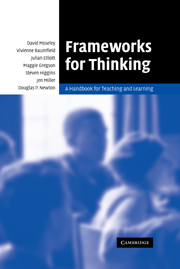Book contents
- Frontmatter
- Contents
- List of figures
- List of tables
- Notes on authors
- Foreword
- Acknowledgments
- Introduction
- 1 The nature of thinking and thinking skills
- 2 Lists, inventories, groups, taxonomies and frameworks
- 3 Frameworks dealing with instructional design
- 4 Frameworks dealing with productive thinking
- 5 Frameworks dealing with cognitive structure and/or development
- 6 Seven ‘all-embracing’ frameworks
- 7 Moving from understanding to productive thinking: implications for practice
- References
- Index
4 - Frameworks dealing with productive thinking
Published online by Cambridge University Press: 22 September 2009
- Frontmatter
- Contents
- List of figures
- List of tables
- Notes on authors
- Foreword
- Acknowledgments
- Introduction
- 1 The nature of thinking and thinking skills
- 2 Lists, inventories, groups, taxonomies and frameworks
- 3 Frameworks dealing with instructional design
- 4 Frameworks dealing with productive thinking
- 5 Frameworks dealing with cognitive structure and/or development
- 6 Seven ‘all-embracing’ frameworks
- 7 Moving from understanding to productive thinking: implications for practice
- References
- Index
Summary
Introduction
The second family group consists of frameworks for understanding critical and creative thinking, which we subsume under the more general term productive thinking. By productive thinking (a term used by Romiszowski, 1981), we understand what Bloom refers to as analysis, synthesis and evaluation and various combinations of these and other processes, when they lead to deeper understanding, a defensible judgment or valued product. It may involve planning what to do and say, imagining situations, reasoning, solving problems, considering opinions, making decisions and judgments, or generating new perspectives. The phrase captures the idea that this kind of thinking is not confined to the analysis of existing arguments, but is also concerned with generating ideas and has consequences for action. It makes little sense to separate critical thinking from creative thinking, since in many situations they overlap and are interdependent.
Thinking as conceptualised within the frameworks included in this family is considered to involve more than cognition, since most theorists also specify dispositions which they believe to be extremely important in the development of productive thinking. Allen and colleagues who limit themselves to argument analysis (Allen, Feezel, and Kauffie, 1967) are exceptions to this generalisation. It should be noted that the role of dispositions was one of the issues which divided the American Philosophical Association's expert panel on critical thinking, although the majority (61%) did regard specific dispositions to be integral to the conceptualisation of critical thinking and 83% thought that good critical thinkers would have certain key dispositions (Facione, 1990).
- Type
- Chapter
- Information
- Frameworks for ThinkingA Handbook for Teaching and Learning, pp. 119 - 184Publisher: Cambridge University PressPrint publication year: 2005



